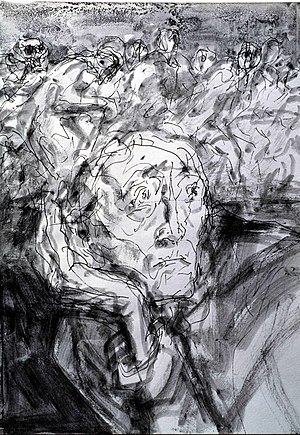
Image via Wikipedia
Most people I know speak of a recurring nightmare:
–Having to take a test you haven’t studied for
–Having to give a talk, but being unprepared
–Not being able to get to the location where your talk or test is to be given
–Feeling under great tension and wearing yourself out trying to accomplish something that you are unable to do
At some point, even if you’re still dozing, you realize it’s a dream. And you feel incredible relief.
If you grew up in basketball state in the U.S. or graduated from a university where basketball is a big sport, you may have watched some or all of the NCAA men’s basketball championship game a few nights ago.
The Butler University basketball team endured a nightmarish game where nothing worked for them. It seemed as if the game would never end.
Whatever would have helped the Butler players— more preparation and practice on shooting two-point shots, less reliance on a star three-point shooter, an arena/ playing field more appropriate to the sport and the age of the players or . . . — the Butler team lived a nightmare in full view of millions of people.
Their desperation was visible, as they played a high-stakes game that was not going to turn out well for them.
Over the years I’ve coached writers for whom the stakes are high . . . . Doctoral students who are panic-stricken at the prospect of writing the required dissertation, people who have given up their day job to write a novel, people who have made promises and commitments and still haven’t done the writing.
Some put off the writing for years, straining the good will and trust of family and spending the capital of advisors, bosses, or colleagues. And now they are paralyzed with fear when they face the computer screen or empty page.
Writing, with its rattling chains, terrifies.
But in order for you to write, your goal is not to be fear-free.
The goal is to feel the fear and manage it. You don’t have to do what the fear says—you don’t need to flee or abandon all hope. Listen to what the fear is telling you to do and then ignore it. Move past it. You ignore that negative inner chatter of your being an imposter and that you don’t have what it takes. You tell yourself that you have everything you need to move forward with this work.
If you haven’t already, you will most likely someday have a nightmare of being unprepared for a test or not having written a paper (or your dissertation), but you can take the steps now that will make that nightmare nothing more than a dream.
How are you managing your fears and your goals? I’d like to hear from you.
My best to you,
Nancy
Nancy Whichard, Ph.D., PCC
Your International Dissertation Coach and Academic Career Coach
www.nancywhichard.com
www.smarttipsforwriters.com
nancy @ nancywhichard.com